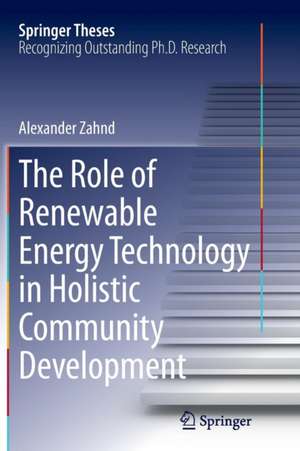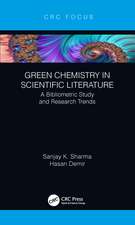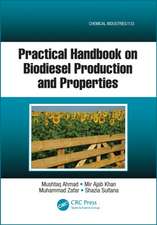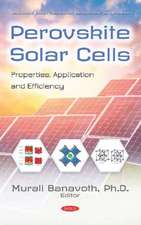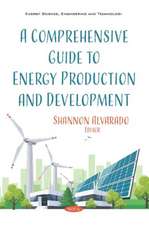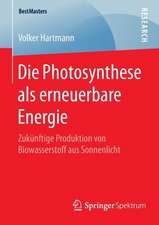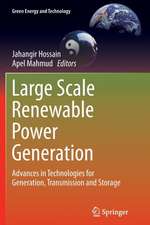The Role of Renewable Energy Technology in Holistic Community Development: Springer Theses
Autor Alexander Zahnden Limba Engleză Paperback – 27 aug 2016
| Toate formatele și edițiile | Preț | Express |
|---|---|---|
| Paperback (1) | 960.93 lei 6-8 săpt. | |
| Springer International Publishing – 27 aug 2016 | 960.93 lei 6-8 săpt. | |
| Hardback (1) | 967.22 lei 6-8 săpt. | |
| Springer International Publishing – 5 feb 2014 | 967.22 lei 6-8 săpt. |
Din seria Springer Theses
- 18%
 Preț: 997.88 lei
Preț: 997.88 lei -
 Preț: 389.88 lei
Preț: 389.88 lei - 15%
 Preț: 646.94 lei
Preț: 646.94 lei - 18%
 Preț: 943.43 lei
Preț: 943.43 lei -
 Preț: 399.29 lei
Preț: 399.29 lei - 18%
 Preț: 944.99 lei
Preț: 944.99 lei - 15%
 Preț: 636.80 lei
Preț: 636.80 lei - 18%
 Preț: 941.05 lei
Preț: 941.05 lei - 15%
 Preț: 643.16 lei
Preț: 643.16 lei - 15%
 Preț: 642.68 lei
Preț: 642.68 lei - 18%
 Preț: 1103.62 lei
Preț: 1103.62 lei - 20%
 Preț: 558.82 lei
Preț: 558.82 lei - 18%
 Preț: 1112.30 lei
Preț: 1112.30 lei - 18%
 Preț: 944.19 lei
Preț: 944.19 lei - 18%
 Preț: 1109.92 lei
Preț: 1109.92 lei - 18%
 Preț: 1217.27 lei
Preț: 1217.27 lei - 15%
 Preț: 640.06 lei
Preț: 640.06 lei - 15%
 Preț: 636.45 lei
Preț: 636.45 lei - 15%
 Preț: 640.06 lei
Preț: 640.06 lei - 15%
 Preț: 640.88 lei
Preț: 640.88 lei -
 Preț: 389.70 lei
Preț: 389.70 lei - 20%
 Preț: 563.89 lei
Preț: 563.89 lei -
 Preț: 393.35 lei
Preț: 393.35 lei - 15%
 Preț: 637.93 lei
Preț: 637.93 lei - 15%
 Preț: 641.85 lei
Preț: 641.85 lei - 18%
 Preț: 1225.94 lei
Preț: 1225.94 lei - 20%
 Preț: 551.36 lei
Preț: 551.36 lei - 18%
 Preț: 1229.10 lei
Preț: 1229.10 lei - 15%
 Preț: 639.25 lei
Preț: 639.25 lei - 18%
 Preț: 999.45 lei
Preț: 999.45 lei - 15%
 Preț: 640.06 lei
Preț: 640.06 lei - 18%
 Preț: 1220.45 lei
Preț: 1220.45 lei - 18%
 Preț: 1116.26 lei
Preț: 1116.26 lei - 18%
 Preț: 1110.72 lei
Preț: 1110.72 lei - 18%
 Preț: 1000.87 lei
Preț: 1000.87 lei - 18%
 Preț: 891.17 lei
Preț: 891.17 lei - 15%
 Preț: 640.06 lei
Preț: 640.06 lei - 5%
 Preț: 1154.07 lei
Preț: 1154.07 lei - 15%
 Preț: 635.96 lei
Preț: 635.96 lei - 15%
 Preț: 640.88 lei
Preț: 640.88 lei -
 Preț: 387.20 lei
Preț: 387.20 lei - 18%
 Preț: 1109.92 lei
Preț: 1109.92 lei -
 Preț: 385.25 lei
Preț: 385.25 lei -
 Preț: 385.25 lei
Preț: 385.25 lei - 18%
 Preț: 1112.30 lei
Preț: 1112.30 lei - 18%
 Preț: 999.45 lei
Preț: 999.45 lei -
 Preț: 386.99 lei
Preț: 386.99 lei - 15%
 Preț: 637.13 lei
Preț: 637.13 lei - 20%
 Preț: 554.20 lei
Preț: 554.20 lei - 20%
 Preț: 555.57 lei
Preț: 555.57 lei
Preț: 960.93 lei
Preț vechi: 1171.86 lei
-18% Nou
Puncte Express: 1441
Preț estimativ în valută:
183.87€ • 192.49$ • 152.14£
183.87€ • 192.49$ • 152.14£
Carte tipărită la comandă
Livrare economică 05-19 aprilie
Preluare comenzi: 021 569.72.76
Specificații
ISBN-13: 9783319381732
ISBN-10: 3319381733
Pagini: 641
Ilustrații: XXX, 611 p. 396 illus., 75 illus. in color.
Dimensiuni: 155 x 235 x 33 mm
Greutate: 0.89 kg
Ediția:Softcover reprint of the original 1st ed. 2013
Editura: Springer International Publishing
Colecția Springer
Seria Springer Theses
Locul publicării:Cham, Switzerland
ISBN-10: 3319381733
Pagini: 641
Ilustrații: XXX, 611 p. 396 illus., 75 illus. in color.
Dimensiuni: 155 x 235 x 33 mm
Greutate: 0.89 kg
Ediția:Softcover reprint of the original 1st ed. 2013
Editura: Springer International Publishing
Colecția Springer
Seria Springer Theses
Locul publicării:Cham, Switzerland
Cuprins
Introduction.- Theory and Context.- Power/Energy Generation and Lighting - Thermal and Processing Technologies.- Thermal Comfort in the Home.- Social and Environmental Issues.- Discussion.- Conclusions.
Notă biografică
Alexander Zahnd is currently international project director at RIDS-Switzerland (www.rids-switzerland.org) and international project supervisor at RIDS-Nepal (www.rids-nepal.org). He received his PhD in Renewable Energy from Murdoch University, Perth, Western Australia, in 2012. In 1996 he started to develop and apply the new concepts of holistic community development (HCD) as a way to improve the overall quality of life of the most remote and poorest mountain communities in the Himalayas. He co-founded the not-for-profit NGO RIDS-Nepal (www.rids-nepal.org) in 2002 and the NGO RIDS-Switzerland (www.rids-switzerland.org) in 2013, both with the goal to develop further HCD projects for mountain communities. From 2001-2010 he has been teaching a renewable energy course at the Kathmandu University in Dhulikhel, Nepal, as well as conducting research in the field of renewable energy technologies for communities and industries in developing countries. Because of his engagement in the field of applied HCD in remote Nepalese villages and his involvement in academic education of engineers in Nepal, he was elected as a member of the Swiss Academy of Engineering Sciences (SATW) in 2007.
Textul de pe ultima copertă
This thesis documents almost twenty years of the author’s work on the development and implementation of a new approach to holistic community development in remote and disadvantaged villages in Nepal. It describes the theoretical basis of the work, the main research activities, and the practical outcomes of the implemented programs. One of the fundamental cornerstones of holistic community development is the provision of appropriate and sustainable solutions for the long-term development of local communities. This requires that people’s own identified needs be recognized and addressed in partnership with them in holistic ways. The author explains the many synergies that result from this holistic approach to community development. Another cornerstone of his approach is to utilise the communities’ locally available renewable resources for long-term sustainable development. One of the key findings of the thesis is that improved access to energy services, such as cooking with a smokeless metal stove in a clean indoor environment, basic indoor lighting, and increased food production and safe food storage (through a greenhouse and a solar drier respectively), need to be at the very heart of any long-term holistic community development project. The thesis demonstrates that tapping into locally available renewable energy resources and converting them, through contextualized and locally manufactured renewable energy technologies, has a central role in long-term holistic community development programs. Such programs are successful because they provide both appropriate technologies and life-changing experiences for the local users involved.
Caracteristici
Nominated as an outstanding PhD thesis by Murdoch University, Perth, Western Australia Offers a comprehensive account of both theory and applications of holistic community development for impoverished mountain regions of Nepal Demonstrates that improved access to energy services, provided through tapping the local available renewable energy resources through contextualized renewable energy technologies, is central for a long-term, holistic community development approach aiming for sustainable improvements of the overall life quality of poor and remote mountain communities Describes the theoretical and practical basis for two novel, holistic community development concepts, called the "Family of 4" and "Family of 4 PLUS", for sustainable, long-term community development Includes supplementary material: sn.pub/extras
